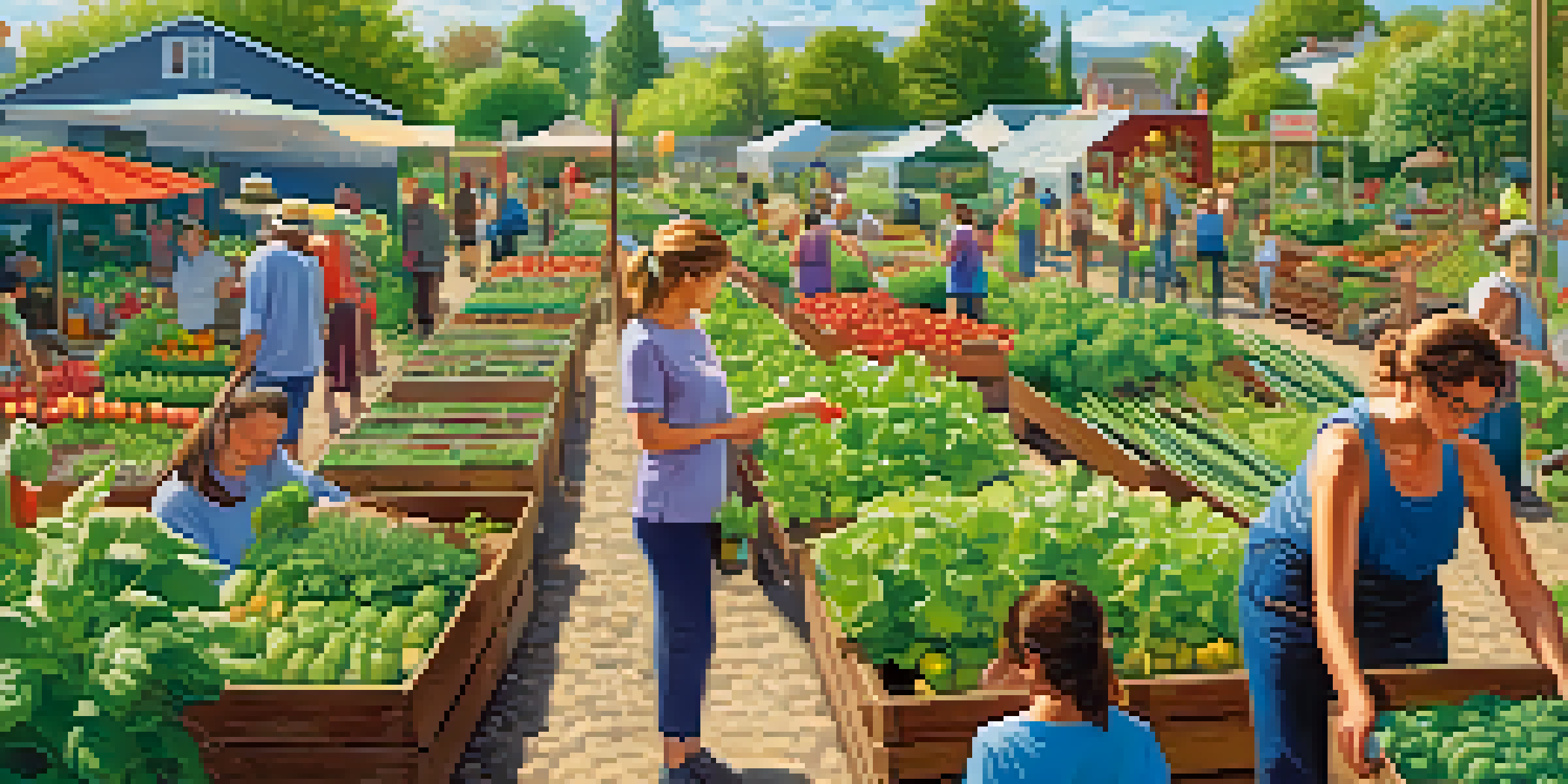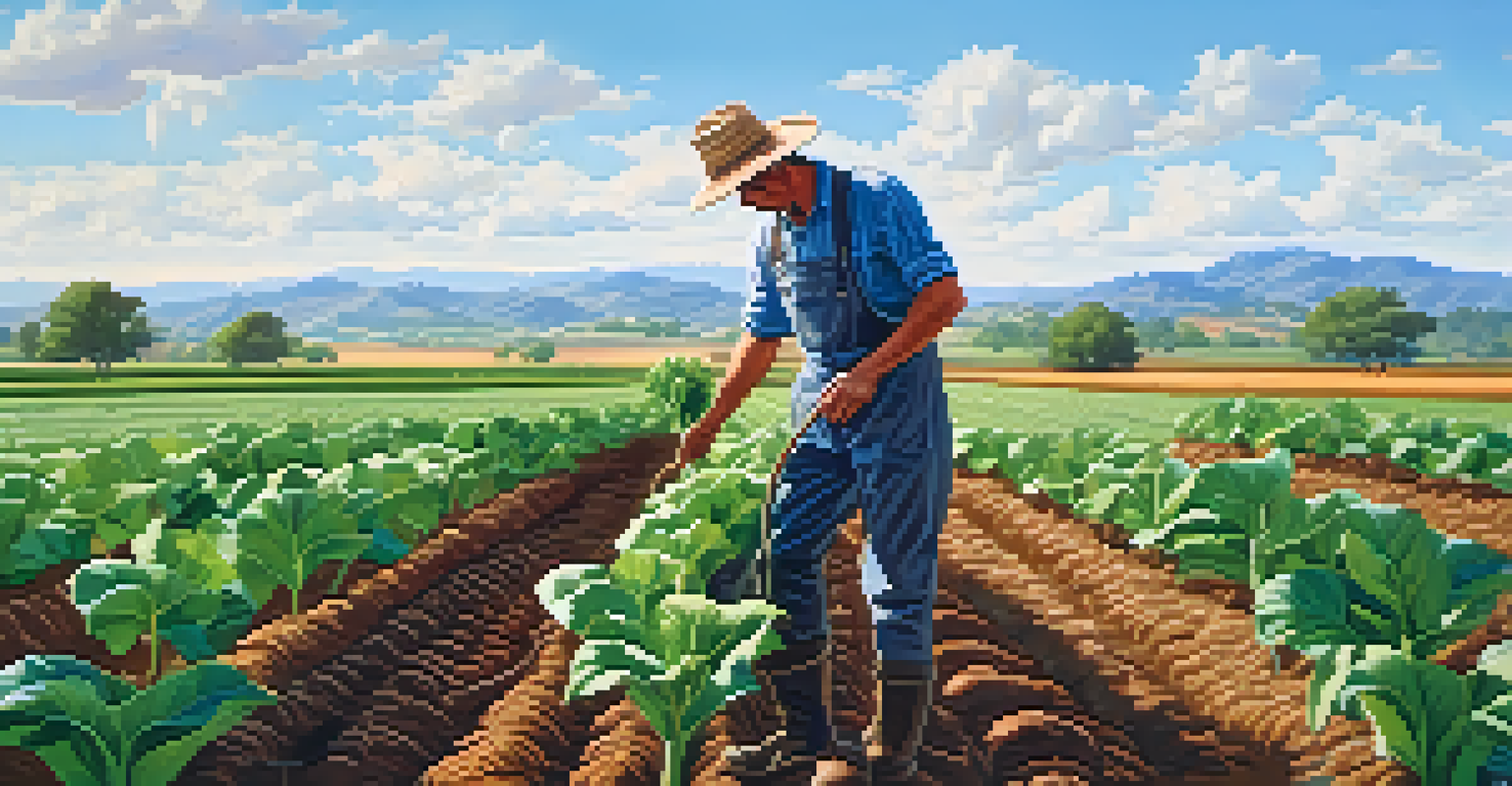Vegan Food Systems and Their Effect on Water Use

Understanding Vegan Food Systems and Their Benefits
Vegan food systems focus on plant-based diets, eliminating animal products. This shift not only promotes health but also impacts environmental sustainability. By prioritizing crops and vegetables, vegan systems aim to reduce the resources needed for food production.
The future will be about plant-based diets. It's not just a trend, it's a necessity for our planet's sustainability.
One key benefit of adopting a vegan diet is its potential to lessen the burden on natural resources, particularly water. Traditional livestock farming requires vast amounts of water for animal hydration, feed crops, and sanitation. In contrast, plant-based farming typically demands less water, making it a more sustainable choice.
As more individuals turn to veganism, the collective effect can lead to significant water savings. This shift can help combat water scarcity issues and promote better management of available freshwater resources, which is crucial in our changing climate.
The Water Footprint of Animal Agriculture
Animal agriculture is notoriously water-intensive. For example, producing one pound of beef can require over 1,800 gallons of water, factoring in everything from drinking water for cattle to the irrigation of feed crops. This staggering figure highlights the unsustainable nature of meat production.

In addition to direct water use, animal farming contributes to water pollution. Runoff from livestock farms can contaminate nearby water sources with nutrients and pathogens. This not only harms aquatic ecosystems but also affects human health and water quality.
Vegan diets save water resources
Adopting a plant-based diet reduces water consumption significantly compared to traditional animal agriculture.
By understanding the water footprint of animal agriculture, we can appreciate the advantages of transitioning to a vegan food system. Reducing our reliance on meat can alleviate the pressure on water resources and help preserve the environment for future generations.
The Water Savings of Plant-Based Diets
Switching to a plant-based diet can lead to substantial water savings. For instance, producing a pound of lentils requires only about 600 gallons of water, which is significantly less than beef. This stark contrast illustrates how vegan diets can contribute to water conservation.
We need to stop thinking of veganism as a sacrifice and start seeing it as a solution to many of the world's problems.
Moreover, many fruits and vegetables have lower water footprints compared to animal products. By prioritizing these foods, individuals can not only improve their health but also play a role in reducing overall water consumption.
As more people adopt plant-based diets, the cumulative water savings can be enormous. This shift can help alleviate pressure on water resources, especially in areas facing drought and water scarcity.
The Role of Sustainable Farming Practices
Sustainable farming practices are crucial in optimizing water use within vegan food systems. Techniques such as crop rotation, cover cropping, and efficient irrigation can significantly enhance water conservation. These practices not only protect the soil but also ensure that plants receive the right amount of water.
By implementing these methods, farmers can minimize water waste and improve crop yields. This is essential for meeting the growing demand for plant-based foods while preserving precious water resources.
Sustainable practices enhance farming
Implementing sustainable farming techniques can optimize water use and improve crop yields in vegan food systems.
Ultimately, integrating sustainable practices into vegan food systems can create a win-win situation: healthier crops and a more sustainable approach to water management.
Case Studies: Successful Vegan Initiatives
Various initiatives across the globe showcase the potential of vegan food systems to conserve water. For example, urban community gardens that focus on plant-based crops have emerged in many cities. These gardens not only provide fresh produce but also promote local water conservation efforts.
Another inspiring example is the rise of plant-based food companies that prioritize sustainable sourcing. By choosing ingredients that require less water, these businesses can reduce their overall environmental impact, appealing to eco-conscious consumers.
These case studies illustrate that vegan food systems are not just theoretical concepts; they are practical solutions that can help tackle water scarcity while promoting healthier lifestyles.
Challenges Facing Vegan Food Systems
Despite the benefits, vegan food systems face several challenges, including accessibility and affordability. In some regions, fresh produce may be difficult to obtain, and prices can be prohibitive for low-income families. These barriers can hinder the widespread adoption of plant-based diets.
Additionally, there is often a lack of awareness about the water savings associated with vegan diets. Many people may not realize the significant impact their food choices can have on water conservation.
Challenges hinder vegan adoption
Accessibility and awareness issues can limit the widespread adoption of vegan diets despite their environmental benefits.
Addressing these challenges requires education and outreach to inform communities about the benefits of vegan food systems and to promote initiatives that improve access to plant-based options.
The Future of Vegan Food Systems and Water Use
Looking ahead, the future of vegan food systems seems bright, especially in terms of water conservation. As awareness grows about the environmental impacts of food choices, more people are likely to embrace plant-based diets. This shift can lead to a significant reduction in water consumption overall.
Innovations in agricultural technology, such as precision farming and hydroponics, also hold promise for optimizing water use. These advancements can help maximize crop yields while minimizing the amount of water required, aligning perfectly with the goals of vegan food systems.

Ultimately, the integration of vegan food systems into our daily lives can play a pivotal role in ensuring a sustainable future, not just for our diets but for our planet's water resources as well.